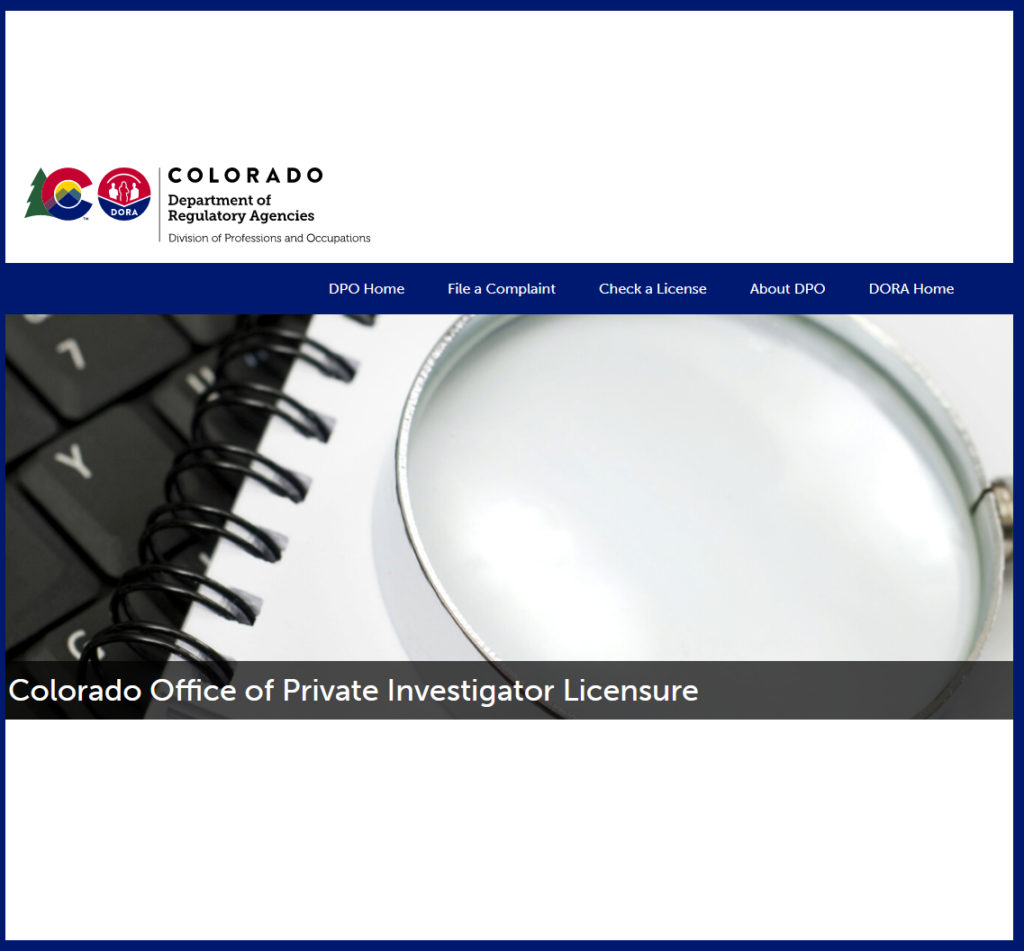
With Governor Jared Polis recently being re-elected by a wide margin, it doesn’t seem likely that state licensing for private investigators will be re-instated any time in the next five years. The requirement was dropped in Colorado as of 1/14/22 when Polis vetoed House Bill 20-1207 in July 2020. The bill called for the continued regulation of private investigators by the state until 2025.
In his veto letter, Polis cited the 2019 Colorado Office of Policy Research and Regulatory Reform (COPRRR) sunset review of the program. The office completed reviews for regulation in 1985, 1987, 2000 and 2006, according to the letter. Each of those times they concluded that regulation is not necessary, Polis said. In 2011, the department reported “through yet another sunrise review” that private investigators should be minimally regulated to ensure they have “either a surety bond or E&O insurance and passage of a jurisprudence examination.”
A History of PI Licensure in Colorado
Until 2015, Colorado was only one of a few states without mandatory private investigator licensing, according to Pursuit Magazine. Colorado did have a long history of legislation surrounding investigations, according to PInow.com, citing references to investigations found in the 1877 Legislative Manual of the State of Colorado. But in 1977, the Colorado Supreme Court determined there wasn’t a clear definition of a “detective business” as it relates to private investigation.
The Colorado legislature eventually passed the Private Investigators Voluntary Licensure Act in 2011, which defined what a private investigator was and outlined voluntary licensure. The law went into effect in 2012. Polis said in his veto letter that the General Assembly took “the extraordinary step” to expand regulation for PIs to mandatory licensure in 2014. This was, in part, due to efforts by the Professional Private Investigator’s Association of Colorado, according to the Pursuit Magazine op-ed. That law went into effect 2015, but it included the sunset clause to review.
Reasons and Effects of the Veto
Polis said that COPRRR’s 2019 scheduled sunset review determined that regulation should not continue. He says that since the mandatory licensing began in 2015, “there have been 77 complaints resulting in only eight disciplinary actions taken against licensees.” In the veto letter, he said occupational licensing is too often used “to protect existing professionals within an occupation against competition from newcomers” and that “eliminating unnecessary credentialing broadens diversity and allows more to offer and access various services,” as one of the reasons for the veto. “This is especially true for PIs, as licensure does not require any continuing education or real test of competency,” he said, adding that he hopes the sunsetting of the regulation will “allow more people to enter the occupation and to access these services.”
He adds in the letter that there is some potential for consumer harm resulting from rare instances of deceptive trade practices, that they maybe be addressed through other areas of law and that he is willing to work with the General Assembly to create legislation that would require a background check and potentially retain some level of insurance or bond. It remains unseen as to how much of a priority this is for the legislature or his administration.
Information about those private investigators who had already been licensed with the state of Colorado before the veto is still available at the Division of Professions and Occupations (DPO) on Colorado’s Department of Regulatory Agency’s website or via open records requests. “Previous public discipline is never purged,” said DORA spokesperson Lee Rasizer, in response to an inquiry. However, the DPO no longer has private investigators under its regulatory authority and has no jurisdiction to investigate new complaints.
So, what does the lack of state licensing for private investigators mean to that profession and its clients and consumers? Is a state license critical to ensuring ethical investigations? What are best practices for those considering hiring a private investigator in Colorado beyond using an established and reputable firm such as Ross Investigators and how much will the lack of state licensure matter going forward? Please share your thoughts by commenting below.
-
Background checks will be discussed at May PPIAC meeting
Erica Davis, a Colorado-based private investigator, will address the May meeting of the Professional Private Investigator Association of Colorado (PPIAC). Formerly with the Boulder Country Sheriff’s Office and the Longmont Police Department, Davis will speak about best practice when it comes to conducting background checks. “Erica’s vast experience and training in background checks and reports will…
-
Child autopsy reports will be secret under new law
Autopsy reports about the deaths of minors will no longer be made public, under a controversial bill making its way through the Colorado statehouse. Despite long being available through the Colorado Open Records Act – which exempts other kinds of personal medical records from public scrutiny – autopsy reports for minors will soon be confidential,…
-
Bundy’s Colorado victim target of new private eye search
The search for Ted Bundy murder victim Julie Cunningham will resume this summer, almost 50 years after she disappeared from Vail, Colorado. Before being executed in 1989, serial killer Bundy confessed to murdering Cunningham – and a string of other young women – and burying her body “in the high desert” north of Rifle. That’s…
Leave a Reply